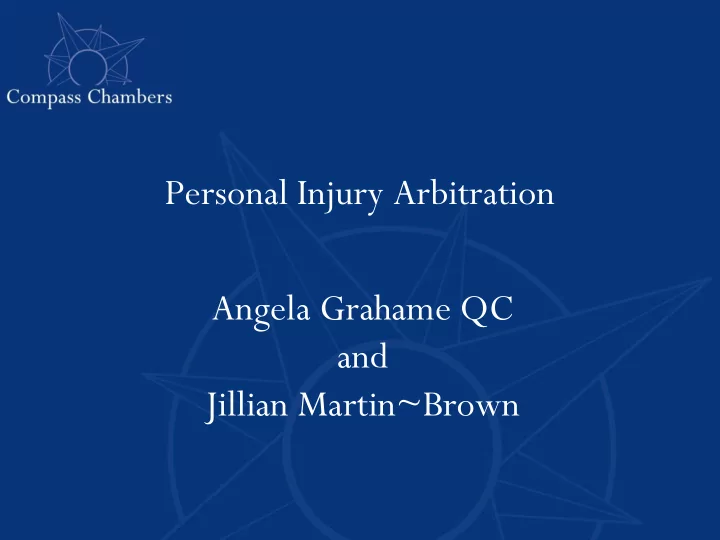

Personal Injury Arbitration Angela Grahame QC and Jillian Martin~Brown
Overview • Background • Development in Scotland • PI Arbitration in England • Advantages and Disadvantages • Interest in PI Arbitration in Scotland
What is Arbitration? • A mechanism of settling disputes and obtaining a final and binding decision, without recourse to a court • Private determination of a dispute by an independent third party • Form of alternative dispute resolution in which the parties to a dispute agree to be bound by the decision of the arbitrator they have appointed
Alternatives • Litigation • Negotiation • Mediation • Med-arb • Arb-med • Expert determination • Adjudication
Key Features • Arbitration clause or • Submission agreement • Ad hoc or • Institutional • Consensual • Non-governmental • Final and binding
Legislation • Arbitration (Scotland) Act 2010 • Old law seen as outdated and unsatisfactory • Stated case procedure disruptive • Scotland adopted the UNCITRAL Model Law regulating international commercial arbitrations in 1990
Legislative Development • English Arbitration Act 1996 • Draft Arbitration (Scotland) Bill initiated in 1997 • Scottish Arbitration Code in 1999 • 2010 Act now provides a comprehensive, modern framework
2010 Act • Main body of the Act regulates foundations of arbitration – seat of the arbitration – enforcement of an arbitral award – interaction between arbitration and the courts
Rules • Schedule 1 includes a set of rules governing the conduct and procedure of the arbitration – appointment of arbitrator – powers of arbitrator • Mandatory rules cannot be modified or disapplied by the parties • Default rules apply unless the parties agree to modify or disapply those rules
Procedure • Rule 28 default rule • In absence of agreement, arbitrator can determine the procedure to be followed in arbitration as well as any evidential matters • Not imitation of court proceedings
Practice • Written statement of case and a response helps focus issues • No need for an actual hearing • Oral evidence permitted • May be combined with witness statements
Comparison With England • Both share fundamental principles – Fairness – Party autonomy – Limited court intervention • Similar procedures for challenging the jurisdiction of the tribunal or awards • 2010 Act has improved upon 1996 Act – Express and detailed confidentiality provision as a default rule – Covers oral agreements to arbitrate
English PI Arbitration • Arbitration is popular in shipping, building and commercial disputes already • PIcArbs set up in England – Pre-action protocol – Proposal to arbitrate – Arbitration agreement – Summary of claim – Arbitrator appointed – Response – Arbitration runs to settlement or trial
English Reasons • Ministry of Justice cuts and closure of courts • Increased court fees • Inefficient county courts • Trials being bumped • Introduction of costs budgeting • Strike outs for procedural default • Delays in assessments of costs
English Reasons • Civil Procedure Rules • Mitchell v News Group Newspapers [2014] 1 W.L.R. 795 • Denton & Others v T H White Limited [2014] 1 W.L.R. 3926
Scottish Reasons? • ASPIC • Moran v Freyssinet [2015] CSIH 76 • Taylor Report on Funding of Civil Litigation
Advantages • Choice of arbitrator • Expertise – FDRS – University of Aberdeen – ACIArb, MCIArb and FCIArb – PI Bolt on option • Efficiency
Advantages • Confidentiality • Convenience • Hot-tubbing
Advantages • Arb-Med • Continuity • Timescales
Disadvantages • Lack of appeal • No powers to compel any action from non parties • Fewer recoveries of documents • Multiparty disputes can be problematic
Costs • Parties pay for tribunal • Hire the arbitrator • Agree in advance • Tenders
Discussion • Pilot case – PIArb v ASPIC – Who will finish first? – Who will save money? • Trial period • Royal College of Physicians and Surgeons in Glasgow
Contact Angela Grahame QC, Vice Dean of Faculty Angela.Grahame@compasschambers.com or vicedean@advocates.org.uk Jillian Martin-Brown, Advocate and MCIArb Jillian.Martin-Brown@compasschambers.com Astrid Smart, Co-Director of Compass Chambers Astrid.Smart@compasschambers.com Robert Milligan QC, Co-Director of Compass Chambers Robert.Miligan@compasschambers.com Dr David Parratt, Director of Training & Education and FCIArb David.Parratt@advocates.org.uk
Recommend
More recommend